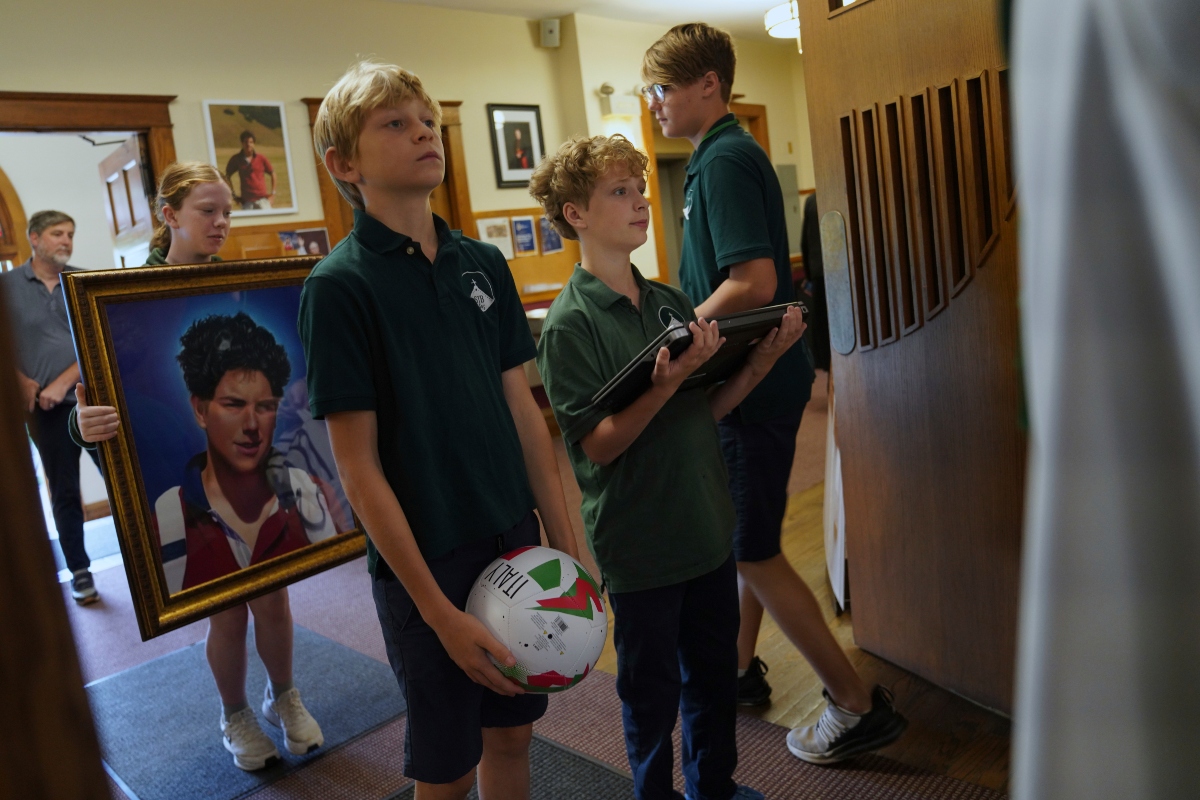Chicago, IL (AP) – At a Catholic school in Pope Leo XIV’s hometown, fifth graders read comic books about Carlo Acutis’ life titled “Digital Disciple.” They draw pictures of what the teenage Italian computer whiz might have had as his cellphone wallpaper. They discuss the miracles that allegedly occurred thanks to Acutis’ intercession.
In the lead-up to Acutis’ canonization on Sunday, it’s all Acutis, all the time at the Blessed Carlo Acutis Parish and school in Chicago. The parish was the first in the United States to take its name from Acutis, who died in 2006 at age 15 and is about to become history’s first millennial saint.
In recent years, Acutis has shot to near rock star-like fame among many young Catholics, generating a global following the likes of which the Catholic Church hasn’t seen in ages. Much of that popularity is thanks to a concerted campaign by the Vatican to give the next generation of faithful a relatable, modern-day role model, an ordinary kid who used his technological talents to spread the faith.
He’s not a towering world figure like Mother Teresa or St. John Paul II, but rather a “saint next door,” said the Rev. Ed Howe, the pastor at Blessed Carlo Acutis Parish in Chicago’s Northwest Side.
“He’s someone who I think a lot of young people today say, ‘I could be the saint next door,'” Howe said.
Pope Leo XIV’s first canonization
Leo, a Chicago native, will declare Acutis a saint on Sunday in his first canonization ceremony, alongside another popular Italian, Pier Giorgio Frassati, who also died young. Both ceremonies had been scheduled for earlier this year, but were postponed following Pope Francis’ death in April.
It was Francis who had fervently willed the Acutis sainthood case forward, convinced that the church needed someone like him to attract young Catholics to the faith while addressing the promises and perils of the digital age.
Acutis was precociously savvy with computers long before the social media era, reading college-level textbooks on programming and coding as a youngster and making websites that at the time were the domain of professionals. But he limited himself to an hour of video games a week, apparently deciding long before TikTok that human relationships were far more important than virtual ones.
“Carlo was well aware that the whole apparatus of communications, advertising and social networking can be used to lull us, to make us addicted to consumerism and buying the latest thing on the market,” Francis wrote in a 2019 document. “Yet he knew how to use the new communications technology to transmit the Gospel, to communicate values and beauty.”
Leo inherited the Acutis cause, but he too has pointed to technology — especially artificial intelligence — as one of the main challenges facing humanity.
A fast-track to sainthood
Acutis was born on May 3, 1991, in London to a wealthy but not particularly observant Catholic family. They moved back to Milan soon after he was born and he enjoyed a typical, happy childhood, albeit marked by his increasingly intense religious devotion.
In October 2006, at age 15, he fell ill with what was quickly diagnosed as acute leukemia. Within days, he was dead. He was entombed in Assisi, which known for its association with another popular saint, St. Francis.
In a remarkably quick process, Acutis was beatified in 2020, and last year Francis approved the second miracle needed for him to be made a saint.
In the years since his death, young Catholics have flocked by the millions to Assisi, where through a glass-sided tomb they can see the young Acutis, dressed in jeans, Nike sneakers and a sweatshirt, his hands clasped around a rosary. Those who can’t make it in person can watch the comings and goings on a webcam pointed at his tomb, a level of internet accessibility not afforded even to popes buried in St. Peter’s Basilica.
The ordinary and the extraordinary
For his admirers, Acutis was an ordinary kid who did extraordinary things, a typical Milan teen who went to school, played soccer and loved animals. But he also brought food to the poor, attended Mass daily and got his less-than-devout parents back to church.
“When I read his story for the first time, it was just like shocking to me, because from a very early age, he was just really drawn to Jesus Christ and he would go to Mass all the time,” said Sona Harrison, an eighth grader at the St. John Berchmans’ school, which is part of the Acutis parish. “I feel like he’s a lot more relatable, and I definitely feel like I’m closer to God when I read about him.”
Acutis earned the nickname “God’s Influencer,” because he used technology to spread the faith. His most well-known tech legacy is the website he created about so-called Eucharistic miracles, available in nearly 20 different languages. The site compiles information about the 196 seemingly inexplicable events over the history of the church related to the Eucharist, which the faithful believe is the body of Christ.
Acutis was known to spend hours in prayer before the Eucharist each day, a practice known as Eucharistic adoration.
“This was the fixed appointment of his day,” his mother, Antonia Salzano, said in a documentary that was airing Friday night at the U.S. seminary in Rome.
An appeal that serves the church
Kathleen Sprows Cummings, a history professor at the University of Notre Dame, said Acutis’ enormous popularity was clearly the result of a concerted church campaign, pushed strongly by his grief-stricken mother. But she said that is nothing new, and that in the 2,000-year history of the church, saints have very often been pushed ahead to respond to a particular need at a particular time.
“It doesn’t detract from the holiness of the person being honored to say that there are choices that are made” about which cases move forward, she said in a phone interview.
Sprows Cummings said that the Acutis phenomenon caught on because he’s attractive to both young people and the institutional church, for using technology in a positive way to spread his profound belief in Eucharistic miracles at a time when many Catholics don’t believe that Christ is truly present in the Eucharist.
“Canonization is about marketing,” said Sprows Cummings, author of “A Saint of Our Own: How the Quest for a Holy Hero Helped Catholics become American.”
“Which stories are going to get told? Who is going to get remembered through this amazingly efficient way of remembering holy people?”
Acutis and his story are ever-present here at the parish named for him. During Mass this week before the canonization, students processed into the chapel under an Acutis banner carrying things he might have carried: a soccer ball, laptop and knapsack.
Howe, the parish pastor and priest of the Congregation of the Resurrection, pulled items out of the knapsack to explain Acutis’ story to the youngest students seated up front: A can of food he might have given to a homeless person, a set of rosary beads he might have prayed with.
The message landed.
“He fed the poor, he cared for the poor,” said 9-year-old David Cameron, who called Acutis “a great man.” Cameron, a fan of Sonic, Minecraft and Halo, also found inspiration in Acutis’ love of video games — and awe at Acutis’ restraint.
“He played video games for like only one hour a week, which I don’t think I can do,” he said.
___
Nicole Winfield reported from Vatican City.
___
Associated Press religion coverage receives support through the AP’s collaboration with The Conversation US, with funding from Lilly Endowment Inc. The AP is solely responsible for this content.






